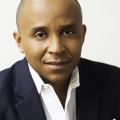My grandfather wasn’t who I thought he was. But learning who he was changed me.
I was still small enough for his shoulders when he bounced me into a voting booth. I was 5 years old. I didn’t know where I was going, but he knew. It was mysterious. I pulled a lever. It made a sound. I had done something in the world, to the world, and gasped. I didn’t even know what it was, but he knew.
Outside of his role in our family, my grandfather played three roles in life that were dear to him: die-hard Mets fan, deacon in his church, never-miss-an-election voter. He was so unbelievably clear in his intention about voting, and perfectly committed to voting. He made that connection between faith and action.
And in his way, he lived out something I think about all the time: how to make our presence in the world powerful enough to change it.
I never knew until he died that Grandpa Charlie, son of sharecroppers, could not read or write. Yet on that day — and on all the many days I’ve remembered that momentous day of voting with him — he gave me the best education I’ve had. He wasn’t voting for a candidate. He was voting for freedom. He was pulling an absolutely critical lever of change. My grandfather genuinely woke up every day believing change was possible. And he woke me up, too.
So then, what was my freedom? What was I committed to? What would I learn to teach, the way he taught me? What levers of change would I pull?
Today, we say our criminal justice system is broken. We dream of a different system. That’s the faith part — believing it’s possible. But we must also walk the road of our dreams, through the very real steps of change; that’s the repairing part. Voting matters not just in the big elections where we can make a statement about our biggest values. Voting with clarity, commitment, and intention matters just as much in the races that actually have the greatest chance of making our most important dreams real. Right now, that means turning our attention to the dozens of district attorney races across the country in which the repair (or continued neglect) of our criminal justice system is at stake. Electing our public prosecutors means getting to decide who is building our future, especially since the criminal justice system so profoundly, unfairly, and unjustifiably affects so many black people, families, and communities. We must take those elections seriously; they are about freedom, too, perhaps even more directly than others.
We’d never elect a president hoping they’ll appoint a secretary of education that will repair our schools, while ignoring the school board elections right in front of us. So why do we think it’s different when it comes to criminal justice? Faith leaders have an incredibly important role to play in connecting the everyday experiences and struggles of their congregants to the most effective actions for repairing our future and making good on our dreams. That means raising up the story of elections we might otherwise ignore.
I think about my grandfather when I think about all those people whom the world has dismissed, but whose voices deserve to count and whose lives deserve to count. How do we make sure no one in power takes their power for granted, and no one who takes our vote takes black people for granted? The only way to repair our future is to restore our power as people, because people are the engine that makes the future bright. And we need some light today.
Got something to say about what you're reading? We value your feedback!

